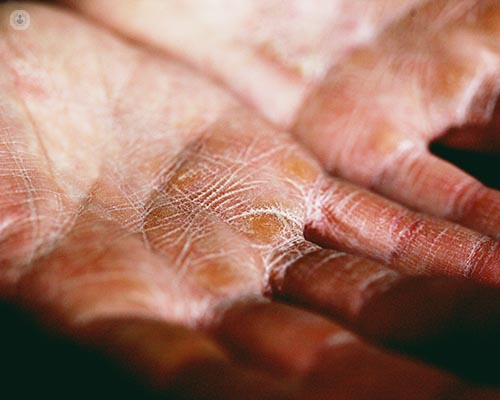Understanding atopic dermatitis (eczema)
Escrito por:Atopic dermatitis, often referred to as eczema, is a prevalent chronic skin disorder affecting millions globally. This condition leads to dry, itchy, and inflamed skin, significantly impacting the quality of life for those who experience it. We speak to a leading dermatologist who explores what atopic dermatitis is, its symptoms, and how it can be managed.

What is atopic dermatitis (eczema)?
Atopic dermatitis, commonly known as eczema, is a chronic skin condition that impacting millions of people worldwide. It's characterised by dry, itchy, and inflamed skin. This condition often appears in childhood but can persist into adulthood, and it may flare up periodically before subsiding. While atopic dermatitis isn’t contagious, it can significantly impact quality of life, especially when it interferes with sleep or causes discomfort.
Eczema is part of a group of related conditions known as the "atopic triad," which also includes asthma and hay fever. People with atopic dermatitis often have a family history of these other allergic conditions, suggesting a genetic component. The exact cause of eczema remains unknown, but it is believed to involve an overactive immune response to irritants and allergens, as well as a weakened skin barrier.
What triggers atopic dermatitis?
Many factors can trigger or worsen eczema symptoms. Common triggers include:
Environmental allergens: Dust mites, pet dander, pollen, and mould can exacerbate symptoms.
Irritants: Everyday products such as soaps, detergents, and even certain fabrics like wool can irritate sensitive skin.
Climate: Cold, dry weather, as well as hot, humid conditions, can both aggravate eczema.
Stress: Emotional stress is a known trigger for eczema flare-ups, as it can affect immune function.
Hormonal changes: Women may experience more frequent flare-ups during menstruation, pregnancy, or menopause.
Understanding and avoiding your triggers, if possible, can play a crucial role in managing symptoms.
How is atopic dermatitis treated?
Although there’s no cure for eczema, treatments aim to manage symptoms and prevent flare-ups. Here are some of the most common approaches:
Moisturisers: Regular application of emollients or moisturisers helps to repair and maintain the skin barrier, reducing dryness and itching.
Topical corticosteroids: These anti-inflammatory creams are often prescribed to reduce redness and inflammation during flare-ups.
Topical calcineurin inhibitors: For sensitive areas like the face and neck, these non-steroid creams can be effective in reducing symptoms.
Oral medications: In severe cases, doctors may prescribe oral corticosteroids or other immunosuppressive drugs to control inflammation.
Light therapy: Also known as phototherapy, this treatment exposes the skin to controlled amounts of natural or artificial light to help improve symptoms.
Maintaining a daily skincare routine and following your prescribed treatment plan are essential to keeping eczema under control.
When should you seek medical advice?
If you suspect you have atopic dermatitis or notice that your symptoms are worsening, it may be time to see a specialist. Persistent itchiness that interferes with daily activities or sleep, painful or cracked skin, and symptoms that don’t improve with over-the-counter treatments are all signs that medical advice is needed.
Additionally, if you notice any signs of infection, such as swelling, warmth, pus, or fever, seek prompt medical attention. A doctor or dermatologist can help you develop an effective treatment plan tailored to your needs, improving your quality of life and helping you manage this chronic condition.


